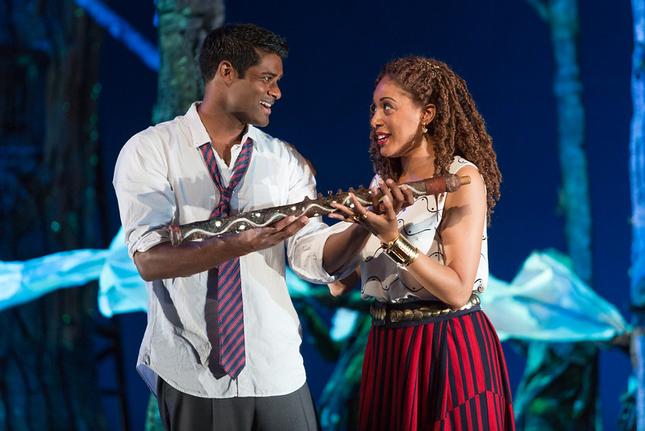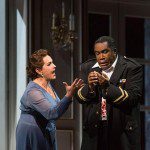Magic of ‘The Magic Flute’ and Madness of Verdi’s ‘Macbeth’ at Glimmerglass
By • August 17, 2015 0 1089

The Glimmerglass Festival at Cooperstown—in its 40th anniversary at Cooperstown in upstate New York this year—has a very Washington vibe to it, and not just because festival director Francesca Zambello is also the artistic director of the Washington National Opera.
The first two of this season’s four productions included a powerful and stirring performance by bass-baritone Simon Owens in the title role of Verdi’s “Macbeth” and noteworthy appearances by bass Solomon Howard in “The Magic Flute” as the magician Sarastro and as the ill-fated Banquo in “Macbeth.” Owens came from a triumphant starring role in this spring’s WNO production of Wagner’s “The Flying Dutchman” and Howard, a member of the WNO’s Domingo-Cafritz Young Artists Program, starred as Muhammad Ali in the new opera “Approaching Ali” two seasons ago at the Washington Opera, as well as appearing as Sarastro in the WNO’s production of “The Magic Flute.”
In addition, Tazewell Thompson, who directs Vivaldi’s “Cato at Utica” here, is well-remembered as a veteran director at Arena Stage here, and Zambello directed “Candide” for the festival.
In the gorgeous lakeside setting at the Alice Busch Opera Theater, we saw the festival-opening productions of “The Magic Flute” and “Macbeth.” On the surface, you couldn’t imagine two operas that were as different in tone and story as these works by Mozart and Verdi. Yet, in key ways, they had some distinct qualities in common. Most notably, the two productions shared unique and imaginative approaches to design and concept, and outstanding singing among the lead roles.
Director Madeline Sayet, working with sometimes startling sets by Troy Hourie and costumes by Kaye Voyce, gave us a version of the familiar and often done “Magic Flute” that seemed fresh in the re-telling and singing. Conceptually, the production mixed and matched a nature-driven and magical set, resonant of a Native American look (which in turn echoed in the local Cooperstown history, where James Fenimore Cooper is a major figure). It’s still the same but slightly newer story in which a bewildered hero named Tamino wanders in search of himself into a strange forest where, with the inept assistance of a local lad named Pagageno, he must go an a quest, win a princess, thwart the Queen of the Night and face the wizard Sarastro.
We’ve seen it a lot—at the WNO or in a movie version by Ingmar Bergman, no less. But this production has a fluid speed, a winning hero in Sean Panikkar who has both charisma and singing ability to spare, and is matched by soprano as the Jacqueline Echols as the heroine Pamina. Soprano So Young Park did not quite have the acting chops for the role of the Queen of the Night, but, vocally, she jumped at the opportunities in the role with rousing and bravura singing.
“Macbeth,” Verdi’s first encounter with Shakespeare, hasn’t often been seen in Washington, but this production, directed by Anne Bogart with an eye for the main dramatic chance as well as an eye for detail, shows you why composers often turn to Shakespeare for their source material and inspiration. So do singers as well evidence in the spectacular performance by Owens in the title role, and he was well matched by soprano Melody Moore as Lady Macbeth.
Bogart offered up several thematic conceits that may have been unsettling to classicists. She split the witches into three groups of “apparitions,” operating in a setting that appeared to be 1930s or pre-or-post war England. The extras that we see often seem to be typical Londoners, in suits, with briefcases and baggage, coming from the market. They’re the ordinary folk that are used to unsettling effect in a second-act set piece which, shows the true suffering of the denizens of Macbeth’s tyrannical kingdom.
While Moore has her musically difficult and powerful moments, it is Owens who bears watching and listening to throughout. Decked out at first as a triumphant but brusque general heavy with medals, he has some uncertainty in his bearing at the beginning, it’s a slow process whereby Owens, with his acting and singing, gradually and frighteningly becomes Macbeth in full, no more so than in the famous Banquo’s ghost scene at a banquet where he repeatedly jumps on a table to joust with the ghost and victim of Macbeth, an apparition no one else can see.
Verdi—with music that offers the full range of emotion and style—does Shakespeare justice with a big assist from conductor Joseph Colaneri. The libretto often stays strictly true to the Bard’s most famous speeches from “Macbeth.” If you’ve never heard Shakespeare truly sung, this is your chance.
All four operas, plus other offerings, will be performed through most of August. For Washington opera lovers, it’s worth a trip to see what’s going on at Glimmerglass. “The Magic Flute” will be performed Aug. 7, 10, 14 and 23. “Macbeth” runs Aug. 8, 13, 15 17 and 22. “Cato in Utica” will be performed Aug. 9, 16, 20 and 22, and “Candide” runs Aug. 6, 8, 11, 15 and 21.
- Sean Panikkar as Tamino and Jacqueline Echols as Pamina in the Glimmerglass Festival’s production of Mozart’s “The Magic Flute.” | Photo by Karli Cadel/The Glimmerglass Festival



